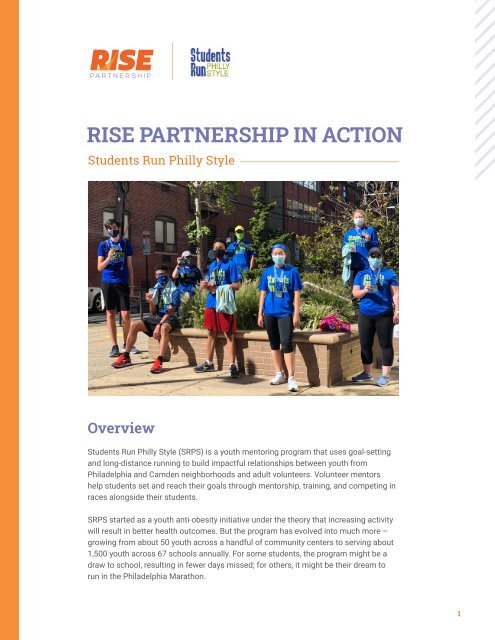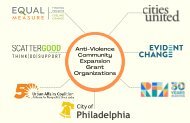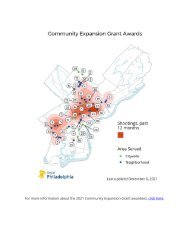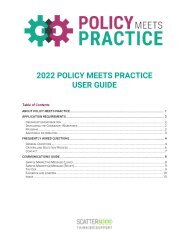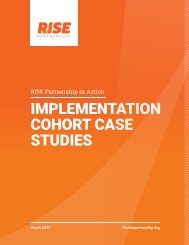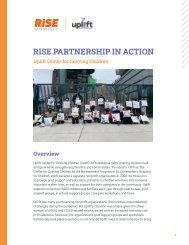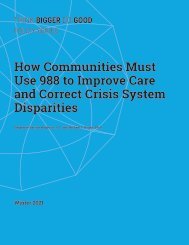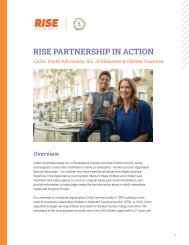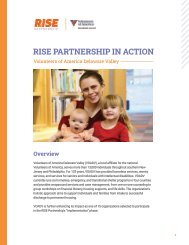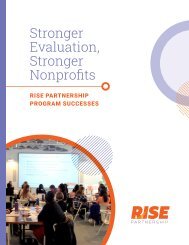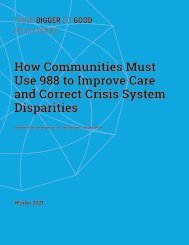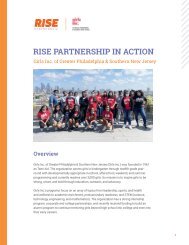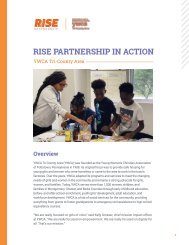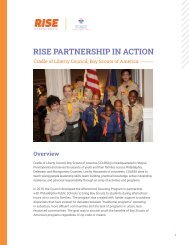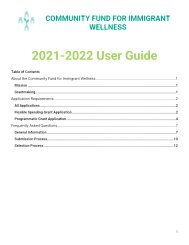RISE PARTNERSHIP IN ACTION :Students Run Philly Style
Create successful ePaper yourself
Turn your PDF publications into a flip-book with our unique Google optimized e-Paper software.
<strong>RISE</strong> <strong>PARTNERSHIP</strong> <strong>IN</strong> <strong>ACTION</strong><br />
<strong>Students</strong> <strong>Run</strong> <strong>Philly</strong> <strong>Style</strong><br />
Overview<br />
<strong>Students</strong> <strong>Run</strong> <strong>Philly</strong> <strong>Style</strong> (SRPS) is a youth mentoring program that uses goal-setting<br />
and long-distance running to build impactful relationships between youth from<br />
Philadelphia and Camden neighborhoods and adult volunteers. Volunteer mentors<br />
help students set and reach their goals through mentorship, training, and competing in<br />
races alongside their students.<br />
SRPS started as a youth anti-obesity initiative under the theory that increasing activity<br />
will result in better health outcomes. But the program has evolved into much more –<br />
growing from about 50 youth across a handful of community centers to serving about<br />
1,500 youth across 67 schools annually. For some students, the program might be a<br />
draw to school, resulting in fewer days missed; for others, it might be their dream to<br />
run in the Philadelphia Marathon.<br />
1
“ What I really appreciate about this partnership is<br />
that we were taught the skills. Just learning those<br />
skills and being able to modify it to adjust anything<br />
that we need, I think is so important to building<br />
capacity in the future.”<br />
Amanda Millatt, associate director of<br />
compliance and project management<br />
<strong>Students</strong> <strong>Run</strong> <strong>Philly</strong> <strong>Style</strong><br />
“It was very evident that the impacts<br />
were much greater than health impacts,”<br />
said Andy Kucer, executive director<br />
at SRPS. “From goal-setting to<br />
confidence, to even academics, we<br />
were seeing the whole plethora of<br />
social-emotional impacts.”<br />
SRPS is further enhancing its impact<br />
as one of 15 organizations selected to<br />
participate in the <strong>RISE</strong> Partnership’s<br />
“Implementation” phase.<br />
For years, SRPS had done a good job<br />
of collecting data from participants.<br />
From paper to electronic spreadsheets<br />
to a database, they would collect data<br />
throughout a season and use it to<br />
inform the following season. But despite<br />
possessing this rich information, SRPS<br />
did not have a sophisticated system<br />
to analyze it to drive programming and<br />
inform current activities.<br />
“We were trying to get a good sense<br />
of our data and how it can inform our<br />
programming in real time,” said Lauren<br />
Kobylarz, program director at SRPS.<br />
“Our goal coming into this was finding<br />
ways to visualize our data that would<br />
help us inform our feedback loop with<br />
our volunteers and then students.”<br />
With the help of the <strong>RISE</strong> Partnership<br />
and technical partner Tech Impact,<br />
SRPS has moved beyond Microsoft<br />
Excel to Microsoft Power BI, a<br />
database and visualization tool that<br />
makes it easy to create reports and<br />
dashboards to analyze data more<br />
efficiently and effectively.<br />
“We have so much data and we really<br />
want to start looking at it and make sure<br />
that we’re making decisions based off<br />
the data we’re collecting,” said Amanda<br />
Millatt, associate director of compliance<br />
and project management at SRPS.<br />
This real-time data is deeply valuable.<br />
Since volunteer mentors log how many<br />
miles students run at practice, the<br />
dashboard can help SRPS identify needs<br />
and areas of support. For example, if<br />
2
“ Our goal coming into this was finding ways to<br />
visualize our data that would help us inform our<br />
feedback loop with our volunteers and then students.”<br />
Lauren Kobylarz, program director<br />
<strong>Students</strong> <strong>Run</strong> <strong>Philly</strong> <strong>Style</strong><br />
nearly all teams are averaging 20 miles<br />
a week, and one team is not, that could<br />
mean a team may not know how to<br />
log miles yet, or that they haven’t been<br />
able to hold practice, or perhaps there’s<br />
an issue at the school. Regardless,<br />
the information can prompt SRPS<br />
staff to reach out to the team to better<br />
understand what’s going on and find<br />
how they can offer support.<br />
The dashboard also has mapping<br />
features to help SRPS better understand<br />
city and neighborhood demographics,<br />
which inform the recruitment of<br />
students and volunteer mentors.<br />
Mapping can be used to match students<br />
and mentors based on geography and<br />
develop teams based on where students<br />
are clustered.<br />
Crucially, the dashboard is not static<br />
and can easily be modified to fit the<br />
needs of SRPS as time passes – and<br />
the staff has been taught how to make<br />
those changes.<br />
“What I really appreciate about this<br />
partnership is that we were taught the<br />
skills,” Millatt said. “Just learning those<br />
skills and being able to modify it to<br />
adjust anything that we need, I think<br />
is so important to building capacity in<br />
the future.”<br />
And while SRPS had been ahead<br />
of the curve when it comes to data<br />
collection and analysis for continuous<br />
improvement, the new dashboard<br />
has further strengthened them in<br />
their quest to become more of a<br />
learning organization.<br />
3
“Our data is never done,” Kobylarz<br />
said. “Our collection is never done.<br />
Our learning is never done. So, the<br />
dashboard is not done.”<br />
“This data that you’re looking at<br />
today is going to raise another<br />
question tomorrow, and then you’re<br />
going to have to go investigate that,”<br />
Kobylarz continued.<br />
For SRPS, <strong>RISE</strong> is all about impact<br />
and improvement.<br />
“[<strong>RISE</strong>] really did force us to have<br />
conversations that gave us a lot of<br />
clarity on how we can really show<br />
the impact of our program, but more<br />
importantly, how we can improve the<br />
program,” said Kucer.<br />
Established in 2018, The <strong>RISE</strong> (Readiness, Implementation, Sustainability for Effectiveness) Partnership supports promising<br />
Greater Philadelphia and Southern New Jersey nonprofit organizations. The <strong>RISE</strong> Partnership Evaluation Funders Learning<br />
Community is the first convening supported by a network of funders in the region. The Learning Community is a collaborative<br />
effort with the Barra Foundation, Campbell Soup Company, Horner Foundation, Nelson Foundation, Philadelphia Foundation,<br />
PropelNext/Edna McConnell Clark Foundation, Scattergood Foundation, and United Way of Greater Philadelphia and Southern<br />
New Jersey, and a partnership with YaleEVAL of The Consultation Center at Yale. The Partnership provides nonprofits with<br />
resources and training to strengthen organizational effectiveness and ensure a greater impact on social, economic, health, and<br />
educational conditions in communities, including the effects of racism, intergenerational poverty and trauma.<br />
For more information visit therisepartnership.org


